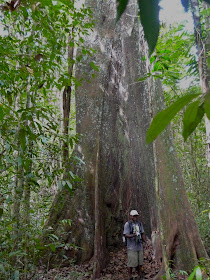
The birding along the river was good, and we added some new birds to the list, but our guides were eager for us to do our hiking in the relative cool of the early morning, so we did not linger over the large-billed terns and black skimmers we saw.
Once on land, and the trail head to Turtle Mountain, we could not help ourselves. A great jacamar pair was making themselves obvious and we spent a half hour admiring them and getting everyone good scope-filling looks at this handsome bird.
Hiking up into the forest rising above the river, we were accompanied every step of the way by the screams of the perfectly named screaming piha. This bird was everywhere we went in the forests of Guyana. It seemed to warn the other birds of our approach. I began to wonder if I lived here in this drippingly humid rain forest, if I would eventually tune out the piha's screams, or if I would run screaming into the forest, driven mad by their ceaseless keening.
We climbed higher and the trail got rougher. Passing into ancient forest, we enjoyed our first close encounters with the giant trees of the Iwokrama reserve. Our guide explained about the uses of the various trees for building, weapon making, and medicine.
Near the summit we had a run of birding that was dizzying. In quick succession we had great looks at the red-necked woodpecker (one of my most-wanted birds), black-tailed trogon, and flame-crested tanager (decent look but I'd welcome another one).
 You might be a red-necked woodpecker if your entire head and neck are red and your chest is burnt orange.
You might be a red-necked woodpecker if your entire head and neck are red and your chest is burnt orange.Following this rush of birds, a small storm of fruits, branches, and poop began raining down from the canopy as a troop of black spider monkeys began encouraging us to leave their forest. they were crashing at high speed through the tree tops, but I managed to get one in the scope long enough to grab a photo.
Just as the heat inside the forest was becoming oppressive and our feet were tiring, we came to the summit and the most welcome breeze I've ever felt. Walking along a small, rocky trail, we made our way to the overlook. What we saw before us was a truly rare thing: green forest stretching to distant mountains, with no evidence—not a single sign—of the hand of man. A river snaked through the green carpet and we learned that sometimes a timber boat passes or a local fishing boat. We noted with great joy that the forest was free of clear cuts or slash-and-burn openings of subsistence farming. The sky was innocent of jet contrails. The air was filled with the songs of birds, the mumblings of insects, the whisper of a breeze. Heaven.
We took this group photo there.
 Our fam trip group atop Turtle Mountain: Kneeling in front Patrick Henry, second row back from left to right: Pelin Karaca, Wally Prince. Third row from left: Asaph Wilson, Andrew Haffenden, Tim Appleton. Back row: Bill Thompson III, Charlie Vogt, Eric Lindberg, Steve Banner, Karen Strauss.
Our fam trip group atop Turtle Mountain: Kneeling in front Patrick Henry, second row back from left to right: Pelin Karaca, Wally Prince. Third row from left: Asaph Wilson, Andrew Haffenden, Tim Appleton. Back row: Bill Thompson III, Charlie Vogt, Eric Lindberg, Steve Banner, Karen Strauss.
After lunching and cooling off with some cold water and fruit juice, it was time to begin the hot walk back down the mountain. Little did we know it, as we began the descent, we'd see even more amazing birds on the way down, but we'd pay for the privilege through the wrath of the weather gods.





